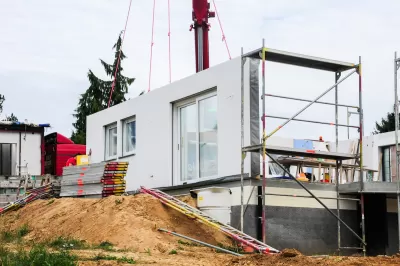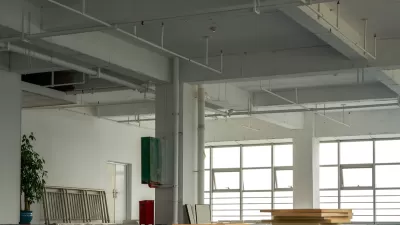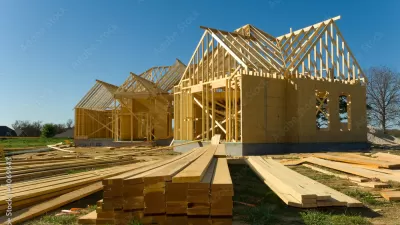Industry leaders say a national set of standards for off-site construction of modular housing would boost the affordable housing stock and make construction faster.

In an opinion piece published in Governing, Matt Belcher, chair of the National Association of Home Builders’ (NAHB) Building Systems Council, argues for reforming regulations governing prefabricated housing construction, which according to Belcher is limited by “a patchwork of state and local regulatory requirements and a lack of understanding of the off-site construction process.”
The diversity of regulations, where they exist, hinders the ability of builders to scale regionally, Belcher writes. Belcher includes a list of benefits of prefabricated, or off-site, construction, which “can deliver projects 20 to 50 percent faster than traditional methods at a cost savings of up to 20 percent” and produce less waste than traditional construction sites.
Belcher advocates for the adoption of a nationwide standard based on local and state regulations developed by Salt Lake City and Virginia, suggested by the International Code Council and Modular Building Institute. “Developed and supported by a broad cross-section of manufacturers, builders, design professionals, affordable-housing advocates and building code officials, ICC/MBI Standards 1200 and 1205 capture best practices from across the country to streamline the deployment of modular projects.”
In Belcher’s view, “Off-site construction offers a unique means to tackle the affordable-housing crisis head on. Policymakers and industry leaders must work together to remove regulatory barriers, including the patchwork application of inconsistent building standards, that are stifling its growth.”
FULL STORY: A Unique Opportunity to Address the Affordable-Housing Crisis: Off-Site Construction

Alabama: Trump Terminates Settlements for Black Communities Harmed By Raw Sewage
Trump deemed the landmark civil rights agreement “illegal DEI and environmental justice policy.”

Study: Maui’s Plan to Convert Vacation Rentals to Long-Term Housing Could Cause Nearly $1 Billion Economic Loss
The plan would reduce visitor accommodation by 25% resulting in 1,900 jobs lost.

Planetizen Federal Action Tracker
A weekly monitor of how Trump’s orders and actions are impacting planners and planning in America.

Waymo Gets Permission to Map SF’s Market Street
If allowed to operate on the traffic-restricted street, Waymo’s autonomous taxis would have a leg up over ride-hailing competitors — and counter the city’s efforts to grow bike and pedestrian on the thoroughfare.

Parklet Symposium Highlights the Success of Shared Spaces
Parklets got a boost during the Covid-19 pandemic, when the concept was translated to outdoor dining programs that offered restaurants a lifeline during the shutdown.

Federal Homelessness Agency Places Entire Staff on Leave
The U.S. Interagency Council on Homelessness is the only federal agency dedicated to preventing and ending homelessness.
Urban Design for Planners 1: Software Tools
This six-course series explores essential urban design concepts using open source software and equips planners with the tools they need to participate fully in the urban design process.
Planning for Universal Design
Learn the tools for implementing Universal Design in planning regulations.
Caltrans
Smith Gee Studio
Institute for Housing and Urban Development Studies (IHS)
City of Grandview
Harvard GSD Executive Education
Toledo-Lucas County Plan Commissions
Salt Lake City
NYU Wagner Graduate School of Public Service





























